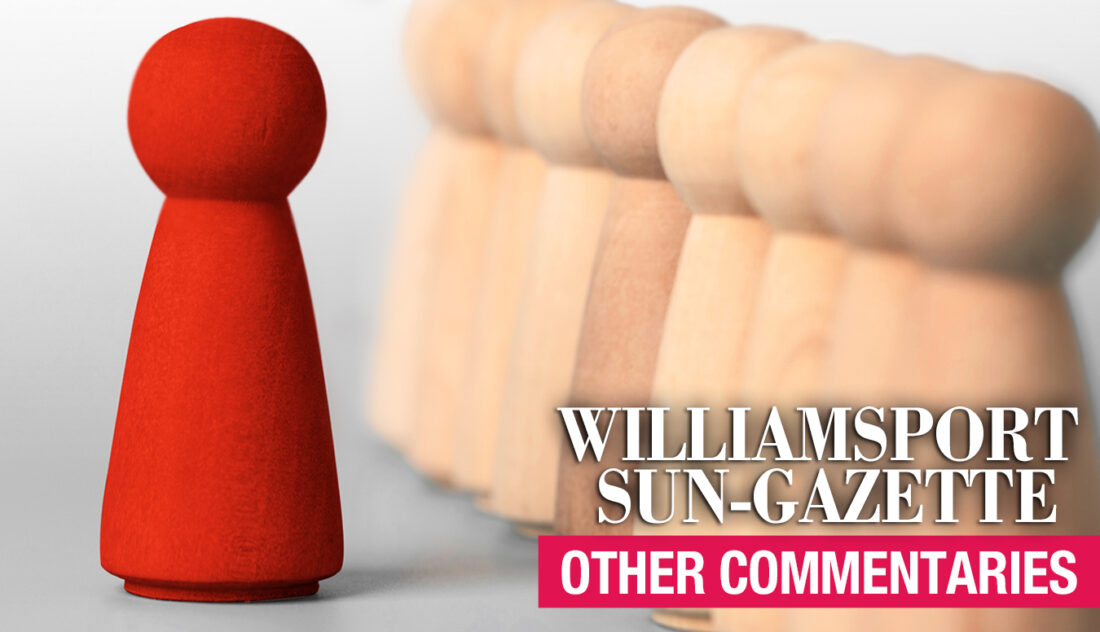Term-limits ordinance respects democratic process, good governance

Male red plastic toy businessman silhouette wooden figure background closeup. Manipulate work recruitment transfer labour inspectorate experience exchange man hr worker subordination human concept
The Sun-Gazette’s Oct. 23 editorial raises important questions about fairness and governance. However, it mischaracterizes both the ordinance and the City Council’s reasoning.
On “Retroactive” Application
The editorial claims the ordinance is “retroactive.” This is incorrect. The ordinance does not invalidate past service, remove anyone from office, or penalize officials for terms already served. It simply establishes that moving forward, consecutive terms are limited. That’s prospective, equitable application, not retroactive. Everyone moving forward has the same set of rules, and exceptions are not made for any current or future official. When speed limits change, drivers aren’t ticketed for past lawful driving–but everyone must follow the new limit moving forward. The same principle applies here.
On Institutional Design
The term limits ordinance addresses a specific governance challenge: Williamsport has experienced both excessive turnover (3.9 year average over nearly 160 years) and occasional extended tenure without clear norms.
This ordinance establishes institutional expectations: eight years provides sufficient time for mayoral vision and implementation while ensuring periodic renewal. Twelve years for city council preserves institutional memory across executive transitions. Twelve years for city controller and the city treasurer to build and the city to benefit from the technical expertise associated with these roles. Additionally, these limits are consecutive in nature. Everyone can run again following a term break that resets the consecutive term limit outlined in the ordinance. These limits create a sustainable structure, not long-term restrictions on current or future individuals.
The goal is predictability and balance–reducing the feast-or-famine pattern of very short tenures punctuated by occasional long ones without a clear governance framework.
On Bipartisan Application
The editorial insinuates certain council members support term limits to ‘eliminate competition’ for future mayoral runs. This fundamentally misunderstands both the policy and the democratic process.
First, the ordinance passed 7-0 (first reading) and 6-0 (second reading), each reading having bipartisan support. It immediately affects:
· A Democratic mayor
· A Republican council member
· A Republican controller
When both parties unanimously support a policy that affects officials of both parties, the “personal ambition” is certainly harder to understand.
Second, several council members may indeed consider running for mayor in the future–there’s nothing wrong with public servants aspiring to higher office. That’s healthy democratic competition, not disqualifying conflict. It is certainly interesting, however, that none of the council members in question ran against the incumbent mayor in 2023, particularly if the mayoral ambition is held.
Third, the ordinance doesn’t ‘eliminate competition’, it establishes the same rules for everyone going forward. If a council member runs for mayor in 2028, they’ll be subject to the same eight-year limit they voted for. That’s not self-dealing; it’s institutional design.
Fourth, and most importantly, if the editorial’s logic held, no elected official could ever vote on a governance structure that might affect their future opportunities. That would make representative democracy impossible.
The question isn’t whether council members have ambitions–it’s whether the policy is good for Williamsport. Seven council members, after careful deliberation, concluded it is.
On Council Authority
Pennsylvania’s Optional Third-Class City Charter Law grants Williamsport authority to structure our own governance. Williamsport adopted this status in 1972 precisely to enable local self-determination. City Council carefully considered legal risk and determined that good governance policy justifies proceeding. Seven elected officials deliberated publicly and reached a consensus. That democratic process deserves respect.
On Reasonable Disagreement
The editorial makes one fair point: there’s a legitimate philosophical question about whether current officials could reasonably expect to serve under previous rules. That’s a defensible position. It’s also defensible to believe that governance structure matters more than individual circumstances, and that all officials should play by the same rules going forward.
Reasonable people can disagree on this balance, but need to participate and convey that disagreement. With discussion and participation from the Mayor, perhaps City Council could have amended the ordinance to reflect the Mayor’s perspective. However, the only feedback Mayor Slaughter conveyed to City Council was after the ordinance had been passed, and then only via email and the media. He chose not to participate during two readings and debate in passing and amending the ordinance. Furthermore, the Sun-Gazette’s characterization of City Council’s position as showing “callow disregard for American principles” misrepresents thoughtful policy debate as unprincipled ambition.
Moving Forward
Williamsport faces significant challenges: structural budget deficits, infrastructure decisions, and the need for collaborative governance. Good governance, including the debate and spirit of term limits, is foundational in addressing these challenges. We remain focused on these priorities while exercising our full optional charter authority.
We should all welcome continued civic debate on governance structure–conducted with accuracy and respect for the democratic process that produced this ordinance.
Councilman JON MACKEY, Ordinance Prime Sponsor
Council President ADAM YODER
Council Vice President ERIC BEITER
Councilman RANDY ALLISON
Councilwoman LIZ MIELE
Councilwoman BONNIE KATZ
Councilman VINCE PULIZZI
Williamsport
Submitted by email

